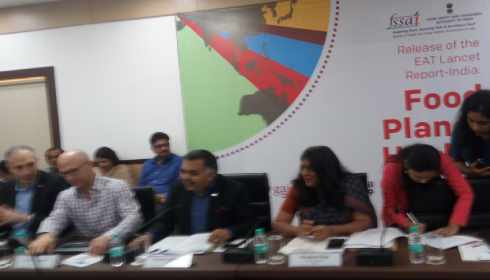
Challenge is in ensuring healthy diet for all in India: EAT-Lancet
BS RAWAT
NEW DELHI: Experts have identified several challenges to ensuring safe food for all in India and said they need commitment from the Government, industry and all key stakeholders, including citizens, to being about a change towards healthy and sustainable diets.
They noted that feeding all people a healthy diet in a sustainable manner without compromising ecology and environment is going to be the most important challenge for India in the coming decades. Also, there is the question of affordability to access healthy diets that should be addressed through partnership with the private sector, they added.
They strongly recommended a ‘Great Food Transformation’ such as taxes on unhealthy foods, subsidies for healthier food options, soft policies, leaderships in the public and private sectors and strong civil society movements.
The suggestions came at the launching ceremony of the EAT-Lancet Commission Report for India in New Delhi. The Food Safety and Standards Authority of India (FSSAI) organized the event on April 4, 2019.
Policy-makers, development agencies, embassy representatives, farmers’ associations, food tech entrepreneurs, researchers and students were present at the launch.
Mr. Pawan Agarwal, CEO, FSSAI said, "Consumer empowerment is the key element of our strategy to create a market- demand for safe food and healthy diets.” He added: “The framework provided in this report is very, very important to us in India.”
Presenting the report, Dr Brent Loken, Director, Science Translation, EAT, remarked, “If we don’t fix the food system, we cannot achieve the UN’s Sustainable Development Goals. The great thing that FSSAI is doing is beginning this conversation in India.”
Dr Loken was followed by Dr K. Srinath Reddy, one of the two Indian Commissioners on the EAT-Lancet Commission said, “We need to find a safe space to provide nutrition security to everyone by 2050.”
Dr. Lawrence Haddad, World Food Prize Winner and Executive Director, GAIN cautioned, “As food systems become more formal and organized, food safety threats increase, not decrease. You can have safe food that is not nutritious but you cannot have nutritious food that is not safe.”
He also urged the need for more data on malnutrition, dietary patterns etc. because “If you cannot measure it, you cannot monitor it and thus cannot change it.
He remarked, “If we can make this happen in India, we can make this happen anywhere in the world. This country is important because the world looks to India for leadership.”